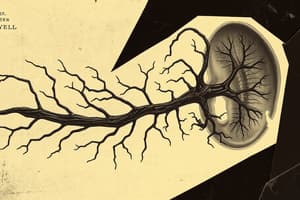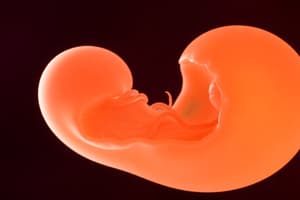Podcast
Questions and Answers
From which embryonic tissue does the nervous system develop?
From which embryonic tissue does the nervous system develop?
- Endoderm
- Ectoderm (correct)
- Neuroectoderm
- Mesoderm
What structure induces the development of the neural plate during embryonic development?
What structure induces the development of the neural plate during embryonic development?
- Neural groove
- Notochord (correct)
- Neural crest
- Neural folds
What is the term for the process by which the neural tube is formed from the neural plate?
What is the term for the process by which the neural tube is formed from the neural plate?
- Secondary neurulation
- Neural migration
- Primary neurulation (correct)
- Neural differentiation
Which part of the neural plate will ultimately develop into the brain?
Which part of the neural plate will ultimately develop into the brain?
What structure forms when cells from the lateral margin of the neural groove migrate?
What structure forms when cells from the lateral margin of the neural groove migrate?
Which of the following processes occurs as the neural plate grows and widens?
Which of the following processes occurs as the neural plate grows and widens?
When during embryonic development do significant changes in the neural plate occur?
When during embryonic development do significant changes in the neural plate occur?
What does the neural groove become as it deepens during development?
What does the neural groove become as it deepens during development?
Which group of neural crest cells differentiates into sensory neurons of cranial nerve ganglia?
Which group of neural crest cells differentiates into sensory neurons of cranial nerve ganglia?
What is the condition resulting from the failure of the anterior neuropore to close?
What is the condition resulting from the failure of the anterior neuropore to close?
Which cells are formed from the neural crest and are critical for myelin formation in peripheral nerves?
Which cells are formed from the neural crest and are critical for myelin formation in peripheral nerves?
What develops from the mesodermal somites adjacent to the neural tube?
What develops from the mesodermal somites adjacent to the neural tube?
Which condition results from the failure of the posterior neuropore to close?
Which condition results from the failure of the posterior neuropore to close?
Holoprosencephaly affects which part of the developing embryo?
Holoprosencephaly affects which part of the developing embryo?
Which of the following nervous system components is composed of postganglionic neurons of the sympathetic and parasympathetic systems?
Which of the following nervous system components is composed of postganglionic neurons of the sympathetic and parasympathetic systems?
From which embryonic structure do the dorsal root ganglia derive?
From which embryonic structure do the dorsal root ganglia derive?
What is the first layer of the forming neural tube to appear?
What is the first layer of the forming neural tube to appear?
In the brainstem, where are motor nuclei positioned in relation to the sulcus limitans?
In the brainstem, where are motor nuclei positioned in relation to the sulcus limitans?
What condition is characterized by the absence of the vertebral lamina, allowing for the exposure of meninges?
What condition is characterized by the absence of the vertebral lamina, allowing for the exposure of meninges?
What developmental feature is formed by the fusion of rhombic lips at the midline?
What developmental feature is formed by the fusion of rhombic lips at the midline?
What characterizes the condition known as encephalocele?
What characterizes the condition known as encephalocele?
Which embryonic age correlates with significant brain development changes, such as in the cerebral cortex?
Which embryonic age correlates with significant brain development changes, such as in the cerebral cortex?
In human brain development, which of the following is considered the last major phase of development before birth?
In human brain development, which of the following is considered the last major phase of development before birth?
Which brain structure is notably organized in a medial-to-lateral arrangement of nuclei?
Which brain structure is notably organized in a medial-to-lateral arrangement of nuclei?
Flashcards are hidden until you start studying
Study Notes
Development of the Nervous System
- The nervous system originates from ectoderm, the outermost embryonic layer.
- By the third to fourth week of development, the notochord from mesoderm induces the neural plate's formation.
- Rapid cell proliferation occurs as the neural plate thickens and expands laterally.
Neural Tube Formation
- The neural plate creates a longitudinal neural groove, further deepening as development progresses.
- The anterior end of the neural plate forms the brain, while the posterior end becomes the spinal cord.
- Primary neurulation takes place when the neural folds fuse, forming the neural tube.
Neural Crest Cell Differentiation
- Neural crest cells migrate and differentiate into various neuron types:
- Sensory neurons of cranial nerve ganglia (CN V, VII, IX, X) and dorsal root ganglia.
- Autonomic ganglion cells for sympathetic and parasympathetic systems.
- Other neural crest derivatives include chromaffin cells, Schwann cells, and melanocytes.
- Surrounding mesodermal tissues, called somites, develop into skeletal muscle, vertebrae, and dermal skin layers.
Neural Tube Defects
- Failure of the anterior neuropore closure results in anencephaly; posterior neuropore closure failure leads to spina bifida.
Brain Vesicle Development
- Three primary brain vesicles form, leading to five secondary vesicles; these are essential for forebrain development.
- The forebrain's development is critical during the fifth and sixth weeks of gestation.
Holoprosencephaly (HPE)
- HPE is a disorder where the prosencephalon does not split into two hemispheres, impacting forebrain and facial development.
Cortical Development
- The cerebral cortex undergoes early and later development stages, transitioning from 28 days to nine months.
Spinal Cord and Brainstem Development
- The ventricular zone is the first proliferative layer of the neural tube, followed by the marginal and mantle layers.
- Cranial nerve nuclei organization in the brainstem is defined by the sulcus limitans, separating sensory and motor nuclei.
Cerebellum Development
- The cerebellum forms from the rhombic lips fusing at midline during brainstem maturation.
Spina Bifida and Encephalocele
- Spina bifida occulta features a failure of the posterior vertebral arch to close, exposing meninges.
- Encephalocele involves cranial defects leading to meninges herniation.
Anencephaly
- Anencephaly is characterized by significant malformation of the brain, resulting from neural tube defect.
Occipital Encephalocele
- Occipital encephalocele is a herniation of cranial contents through a defect in the skull, typically affecting the occipital region.
Studying That Suits You
Use AI to generate personalized quizzes and flashcards to suit your learning preferences.




